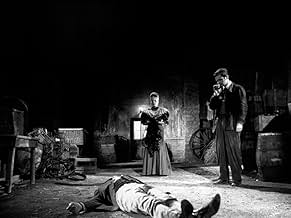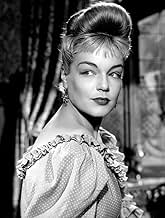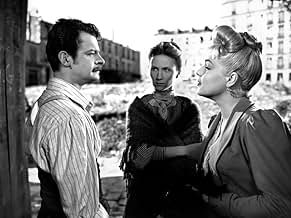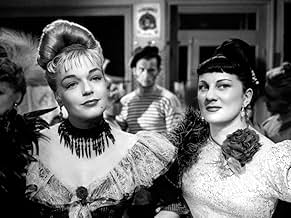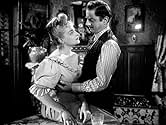IMDb रेटिंग
7.6/10
6.5 हज़ार
आपकी रेटिंग
बेले ओप्पो फ्रांस में तीन गैंगस्टर और एक पहले जेल जा चुका बढ़ई, सभी एक ही सुनहरे बालों वाली सुंदर, महिला पर लट्टू हो जाते हैं.बेले ओप्पो फ्रांस में तीन गैंगस्टर और एक पहले जेल जा चुका बढ़ई, सभी एक ही सुनहरे बालों वाली सुंदर, महिला पर लट्टू हो जाते हैं.बेले ओप्पो फ्रांस में तीन गैंगस्टर और एक पहले जेल जा चुका बढ़ई, सभी एक ही सुनहरे बालों वाली सुंदर, महिला पर लट्टू हो जाते हैं.
- 1 BAFTA अवार्ड जीते गए
- 2 जीत और कुल 2 नामांकन
Solange Certain
- L'amie de Paulo
- (as Solange Certin)
Émile Genevois
- Billy - membre de la bande
- (as Emile Genevois)
फ़ीचर्ड समीक्षाएं
Marie supports a bonnet made of gold, her hair encapsulates, entwines and folds, she's a hoodlum's fancy doll, not the happiest of moll, but then Georges Manda starts to dance, and takes a hold. A few days later theirs a fight behind a bar, the two adversaries will scrap and fight and spar, with a blade casually tossed, by Leca, the gangster boss, leaving one with injuries, that will not scar.
Still an engrossing tale of love, honour and deceit, all centred around Marie, beautifully portrayed and performed by Simone Signoret, as she tries to escape the gangs and back alleys of Paris for a man she's recently fallen for.
Still an engrossing tale of love, honour and deceit, all centred around Marie, beautifully portrayed and performed by Simone Signoret, as she tries to escape the gangs and back alleys of Paris for a man she's recently fallen for.
In a poll in 1979 ,Becker's chef d'oeuvre was part of the top ten of the best French movies of all time.
It's arguably Becker's best work;he achieved a luminous movie with many unforgettable scenes : -the small boats on the river,and the pack arriving at the guinguettes,those cafes down by the river Seine which are no longer part of the landscapes.(remember Duvivier's "la belle équipe" ,1936) -all the scenes in the country where the nature seems to protect the lovers as a mother would do.Most of all,this admirable sequence when Reggiani 's sleeping :he opens his eyes and Marie's luminous beauty moves him deeply -never a director filmed Signoret as Becker did- -The scene which climaxes the opus is the one in the church.They hear the whole congregation sing the "Kyrie " in a tiny church:there's a wedding there.So Marie urges Manda to come in and they attend the ceremony.When they leave ,they learn tragic news.Now the bell is tolling for them,even if these are wedding bells.
-The final scenes between Reggiani/Manda and his old pal Bussières /Raymond display Becker's love of loyalty,manly friendship ,a subject which would come back in later works ,muted in "touchez pas au grisbi" and became an absolute pessimism in "le trou" where nobody could be trusted anymore.
-The score which Becker used in the last sequences is none other than the old French folk song "le temps des cerises" actually an organizing song,a revolutionary song ,since it was the anthem of the Commune in 1871.
"Casque d'or" is one of the jewels of the French cinema.Becker used to like the Apaches (=ruffians) ,the outcast,cause he would transfer Leblanc's Arsene Lupin adventures to the screen in 1957.A failed attempt though.But "Casque d'or" generally looked upon as Becker's peak ,hasn't aged a bit.
It's arguably Becker's best work;he achieved a luminous movie with many unforgettable scenes : -the small boats on the river,and the pack arriving at the guinguettes,those cafes down by the river Seine which are no longer part of the landscapes.(remember Duvivier's "la belle équipe" ,1936) -all the scenes in the country where the nature seems to protect the lovers as a mother would do.Most of all,this admirable sequence when Reggiani 's sleeping :he opens his eyes and Marie's luminous beauty moves him deeply -never a director filmed Signoret as Becker did- -The scene which climaxes the opus is the one in the church.They hear the whole congregation sing the "Kyrie " in a tiny church:there's a wedding there.So Marie urges Manda to come in and they attend the ceremony.When they leave ,they learn tragic news.Now the bell is tolling for them,even if these are wedding bells.
-The final scenes between Reggiani/Manda and his old pal Bussières /Raymond display Becker's love of loyalty,manly friendship ,a subject which would come back in later works ,muted in "touchez pas au grisbi" and became an absolute pessimism in "le trou" where nobody could be trusted anymore.
-The score which Becker used in the last sequences is none other than the old French folk song "le temps des cerises" actually an organizing song,a revolutionary song ,since it was the anthem of the Commune in 1871.
"Casque d'or" is one of the jewels of the French cinema.Becker used to like the Apaches (=ruffians) ,the outcast,cause he would transfer Leblanc's Arsene Lupin adventures to the screen in 1957.A failed attempt though.But "Casque d'or" generally looked upon as Becker's peak ,hasn't aged a bit.
Simone Signoret plays a beautiful woman of ill repute who is at the center of several men's affections - her hotheaded gangster boyfriend, an ex-criminal who's turned over a new leaf, and the leader of the gang himself. It's a pretty simple story but very well told by Jacques Becker, with the scenes involving a double cross and its brilliant ending standing out. The cinematography is wonderful, including an outdoor dance evoking the paintings of Renoir, a beautiful walk along the riverside, and the claustrophobic cells inside a police van. Signoret is radiant, defiant even as she's slapped around and with an air of sweet happiness when she's able to get away from it all, and Serge Reggiani is strong as well. Really just a solid film, one that expresses the spirit of France in the 1950's via its filmmaking, and a small window into the Belle Époque as well.
10jotix100
Jacques Becker's "Casque d'or" is a fine example of the best in the French cinema. At times, this splendid 1954 film, keeps reminding us about paintings of the impressionist school, especially Renoir, because it takes us back to that era. In fact, the beginning of the film almost gives the impression we are witnessing characters that inspired the painters of that art movement.
"Casque d'or" is enhanced by the magnificent black and white photography of Robert Lefevbre who has a poetic way to get the best of what M. Becker intended him to do. The atmospheric music of Georges Van Parys takes the viewer back to those places one has seen in different paintings of that era.
The lovely young woman at the center of the picture, Marie, gets taken with Manda the moment he enters the country restaurant where she is seen with some of the petty criminals she is friendly with. One realizes this is a passion that is not meant to be from the start. Marie belongs to one of the Felix Leca's gang. When Roland senses his girl has an eye for another man, he wants to take get rid of him.
Georges Manda has also been to jail, but now is a carpenter and trying to go straight. Fate is not kind to Manda, who, when provoked, reveals he is not to be made a fool. Leca, who is also quite smitten by Marie's beauty plans to get rid of Manda so he can have the blonde woman all to himself. Leca, who knows his way around the law, and is friendly with the police, will prove to be Manda's undoing.
What Jacques Becker achieved with this film was to create the right atmosphere to set his story. Working in France he had the access to the great movie locations one sees in the movie. The film evokes that period convincingly. The director adds touches, that even when watched today, are a delight to watch.
M. Becker got good performances out of his cast. Simone Signoret at that point of her life was at her prime. Her Marie is a fine example of what she was able to project without much effort. Her beauty is evident and she plays Marie with elegance. Serge Reggiani plays Manda with conviction. M. Reggiani covered quite a lot of ground in the French cinema. Aside from his good looks, he was an accomplished actor and singer. His contribution to our enjoyment of the film made "Casque d'or" to be a classic it became. Claude Dauphin is Felix Leca, the unscrupulous man in love with Marie who will stoop so low in order to get the woman that he wouldn't have otherwise. M. Dauphin conveys the evil in Felix Leca with an economy that works well in his portrayal of this sophisticated monster.
Finally, this is Jacques Becker's triumph. "Casque d'or" is one of the best films of all times.
"Casque d'or" is enhanced by the magnificent black and white photography of Robert Lefevbre who has a poetic way to get the best of what M. Becker intended him to do. The atmospheric music of Georges Van Parys takes the viewer back to those places one has seen in different paintings of that era.
The lovely young woman at the center of the picture, Marie, gets taken with Manda the moment he enters the country restaurant where she is seen with some of the petty criminals she is friendly with. One realizes this is a passion that is not meant to be from the start. Marie belongs to one of the Felix Leca's gang. When Roland senses his girl has an eye for another man, he wants to take get rid of him.
Georges Manda has also been to jail, but now is a carpenter and trying to go straight. Fate is not kind to Manda, who, when provoked, reveals he is not to be made a fool. Leca, who is also quite smitten by Marie's beauty plans to get rid of Manda so he can have the blonde woman all to himself. Leca, who knows his way around the law, and is friendly with the police, will prove to be Manda's undoing.
What Jacques Becker achieved with this film was to create the right atmosphere to set his story. Working in France he had the access to the great movie locations one sees in the movie. The film evokes that period convincingly. The director adds touches, that even when watched today, are a delight to watch.
M. Becker got good performances out of his cast. Simone Signoret at that point of her life was at her prime. Her Marie is a fine example of what she was able to project without much effort. Her beauty is evident and she plays Marie with elegance. Serge Reggiani plays Manda with conviction. M. Reggiani covered quite a lot of ground in the French cinema. Aside from his good looks, he was an accomplished actor and singer. His contribution to our enjoyment of the film made "Casque d'or" to be a classic it became. Claude Dauphin is Felix Leca, the unscrupulous man in love with Marie who will stoop so low in order to get the woman that he wouldn't have otherwise. M. Dauphin conveys the evil in Felix Leca with an economy that works well in his portrayal of this sophisticated monster.
Finally, this is Jacques Becker's triumph. "Casque d'or" is one of the best films of all times.
10pzanardo
Jacques Becker was an artist and a director. His legacy is a trilogy of masterpieces: "Casque d'Or", "Touchez pas au Grisbi", "Le Trou", three luminous instances of cinema as art.
The linear story of "Casque d'Or" has the neatness of a Maupassant's tale. We are transferred into a most glorious epoch for French culture and art: the decline of the 19th century, the age of Impressionism. Marie (Simone Signoret) is a blond beauty, a cheerful "lost woman". She's the girl-friend of a member of a gang of small-time but ruthless criminals. She falls in first-sight-love with George Manda (Serge Reggiani) a former crook, now a honest carpenter. Predictable troubles ensue...
The atmosphere of the epoch is wonderfully recreated, with a black-and-white photography of indescribable beauty. An Impressionist Master behind the camera couldn't have done better. And, in fact, Becker was a favorite "student" of director Jean Renoir, Auguste Renoir's son. Becker's characteristic narrating style is nostalgic, serene, gently ironic. He deliberately avoids over-dark tones in his representation of the underworld, even in the middle of tragic events.
Simone Signoret is a charismatic presence on the screen: outstanding is her use of body-language to draw Marie's character, both a romantic enamoured woman and a cynical harlot. Reggiani is excellent as the laconic, tough Manda: he utters some twenty words along the whole movie, yet we perfectly understand his peculiar honor code, his profound love for Marie, his unselfish devotion to friendship. Splendid is Leca (Claude Dauphin), the boss of the gang, officially a respectable well-off wine-dealer: proficient, cool-headed, extremely cunning and Machiavellian, always ready to betray his own men to pursue his dirty purposes. Indeed, great care is paid to the design of all characters, with superb acting by the whole cast.
Exquisite poetic touches permeate the movie... Marie drags Manda into a church, where a simple wedding (of unknown middle-class people) is taking place. Shortly after, Manda is impatient "Let's go"; and Marie "No, just another minute"... and she contemplates the wedding with a dreaming smile...
"Casque d'Or": a perfect work of art.
The linear story of "Casque d'Or" has the neatness of a Maupassant's tale. We are transferred into a most glorious epoch for French culture and art: the decline of the 19th century, the age of Impressionism. Marie (Simone Signoret) is a blond beauty, a cheerful "lost woman". She's the girl-friend of a member of a gang of small-time but ruthless criminals. She falls in first-sight-love with George Manda (Serge Reggiani) a former crook, now a honest carpenter. Predictable troubles ensue...
The atmosphere of the epoch is wonderfully recreated, with a black-and-white photography of indescribable beauty. An Impressionist Master behind the camera couldn't have done better. And, in fact, Becker was a favorite "student" of director Jean Renoir, Auguste Renoir's son. Becker's characteristic narrating style is nostalgic, serene, gently ironic. He deliberately avoids over-dark tones in his representation of the underworld, even in the middle of tragic events.
Simone Signoret is a charismatic presence on the screen: outstanding is her use of body-language to draw Marie's character, both a romantic enamoured woman and a cynical harlot. Reggiani is excellent as the laconic, tough Manda: he utters some twenty words along the whole movie, yet we perfectly understand his peculiar honor code, his profound love for Marie, his unselfish devotion to friendship. Splendid is Leca (Claude Dauphin), the boss of the gang, officially a respectable well-off wine-dealer: proficient, cool-headed, extremely cunning and Machiavellian, always ready to betray his own men to pursue his dirty purposes. Indeed, great care is paid to the design of all characters, with superb acting by the whole cast.
Exquisite poetic touches permeate the movie... Marie drags Manda into a church, where a simple wedding (of unknown middle-class people) is taking place. Shortly after, Manda is impatient "Let's go"; and Marie "No, just another minute"... and she contemplates the wedding with a dreaming smile...
"Casque d'Or": a perfect work of art.
क्या आपको पता है
- ट्रिवियाLiterary critics at the time were outraged by the fact that Jacques Becker chose to emphasize atmospherics at the expense of psychology. Nevertheless, Becker's approach had a profound effect on the young film-makers that would later go on to form the French New Wave, thereby changing French cinema forever.
- भाव
[English subtitled version]
Old Woman Joinville Bar Patron: Charming! We can't go anywhere without meeting tarts.
- कनेक्शनEdited into Apostrophes: Les plaisirs populaires (1989)
- साउंडट्रैकSobre las Olas
(uncredited)
Music by Juventino Rosas
[The music to which Marie reluctantly dances with Roland at Joinville]
टॉप पसंद
रेटिंग देने के लिए साइन-इन करें और वैयक्तिकृत सुझावों के लिए वॉचलिस्ट करें
- How long is Casque d'Or?Alexa द्वारा संचालित
विवरण
बॉक्स ऑफ़िस
- दुनिया भर में सकल
- $1,413
- चलने की अवधि1 घंटा 39 मिनट
- रंग
- पक्ष अनुपात
- 1.37 : 1
इस पेज में योगदान दें
किसी बदलाव का सुझाव दें या अनुपलब्ध कॉन्टेंट जोड़ें


